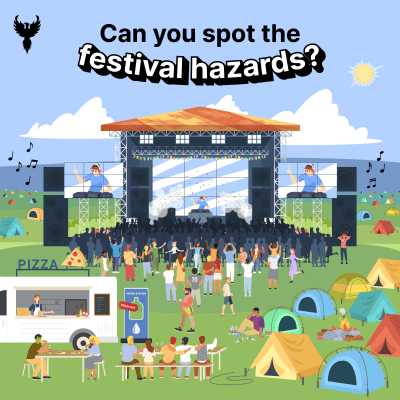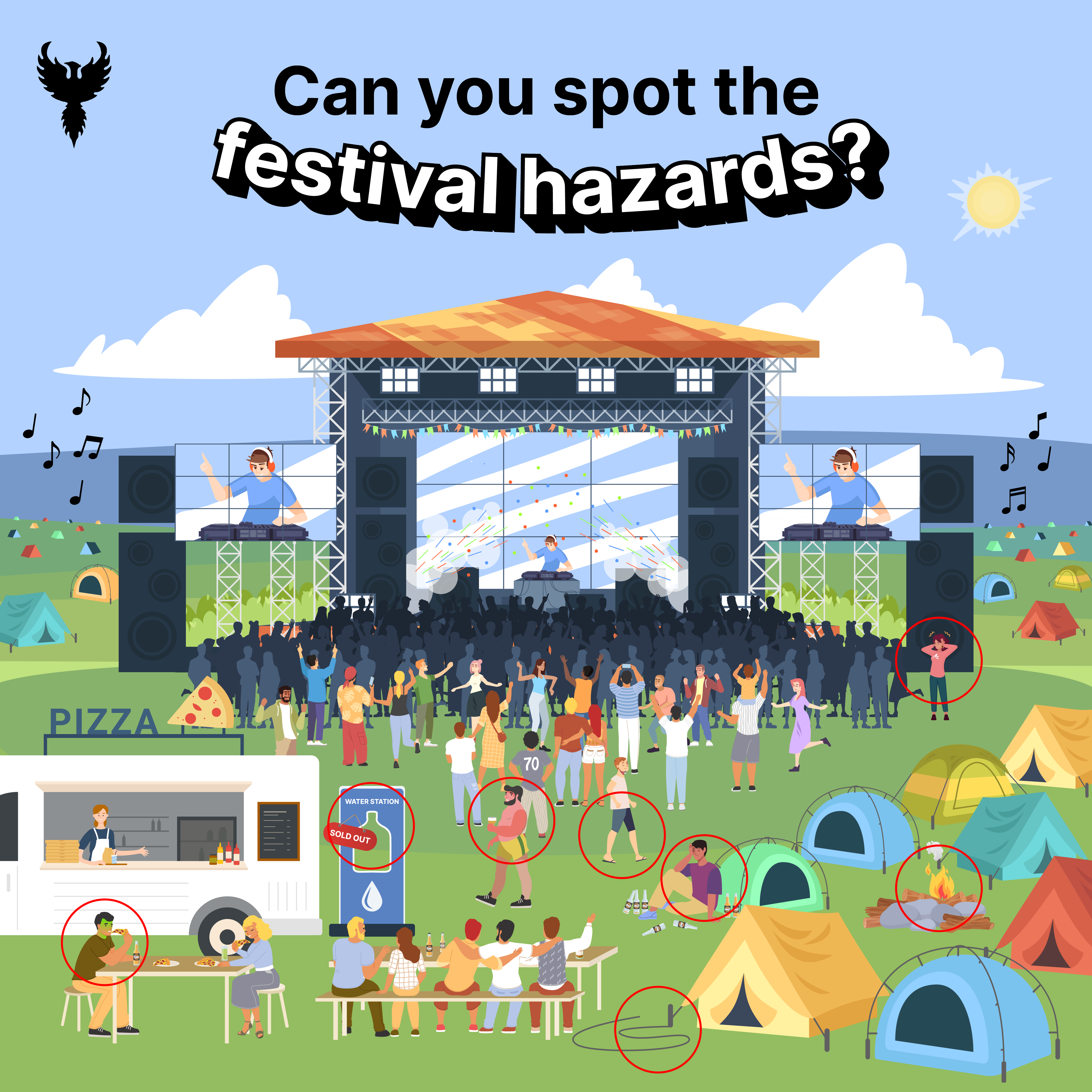Less than 20% of people can spot all of these festival hazards, can you?

Festival season is upon us, and as Glastonbury creeps closer, hundreds of thousands of Brits will soon be enjoying a music filled summer. Outdoor music events are a huge part of British summertime culture, with an estimated 1.3 million festival tickets sold in 2023.
Festivals are high-risk in nature; drinking alcohol in the sun, high-decibel music and crowds are just some of the hazards you are faced with while present on a festival site. To help festival goers understand some of the risks they might face, we have created a brainteaser highlighting some of the potential hazards.
The festival scene contains 8 different hazards. It takes people 90 seconds on average to spot the potential dangers, and less than a fifth (17%) can spot all 8, can you beat the time?

If you’re struggling, you should be looking for:
A dangerous campfire
Someone risking hearing damage
A sunburned reveller
Tent trip hazards
A dehydration risk
A case of food poisoning
Some unsuitable flip flops
Dangerous drinking
Still struggling? The answers are revealed below:

Wear suitable clothing and footwear
Robert stresses: “While it’s fun to put on colourful and lively outfits, wearing unsupportive shoes like sandals or flip-flops can easily lead to sprained ankles or stepping on something sharp, which could result in the rest of your weekend being a lot less enjoyable.
“Make sure you are wearing comfortable clothing that allows for easy movement and is weather appropriate, along with closed-toe shoes with good traction and support that can help prevent slips, trips and falls on uneven ground.”
Whether it is your first time attending a festival, or you’re a seasoned punter who knows their way around the fields, Robert White, chief revenue office at Phoenix has provided the top tips you need to know to ensure the safety of yourself and those around you.
Protect your ears
Hannah Samuels, an Audiologist at Boots Hearingcare advises: "Prolonged exposure to loud music can permanently damage the delicate structures of the inner ear and cause hearing loss and tinnitus. Due to the fact that hearing loss is progressive and doesn't hurt, people often don't notice issues until it's already quite significant. The maximum length of time a person should be exposed to loud sounds can be surprising too. For example, a loud rock concert of 103dB could cause permanent damage after just 7.5 minutes.”
Robert adds: “Thankfully there’s a wide range of hearing protection available, that will defend your ears without sacrificing the festival experience. For example, you can purchase a pair of earbuds that help to filter out the loudest levels of sound, allowing you to hear clearly but at levels safer for your ears.”
Stay hydrated and protect yourself from the sun
Robert says: “Being outdoors in the heat can be physically demanding, especially if you’re on your feet dancing. If you combine this with drinking alcohol, it can easily lead to exhaustion. It's important to stay hydrated by drinking plenty of water throughout the day, so make sure you have a large reusable bottle to keep refilling and take regular drinking breaks.
“Additionally, don’t forget to wear sufficient sunscreen with an SPF of at least 30 and reapply every two hours. Even on a cloudy day, the UV rating can be high so don’t leave it to chance. If it’s sunny, I’d also suggest wearing a hat to protect yourself from the sunstroke.”
Take regular breaks
Robert explains: “Not getting enough sleep and then spending hours drinking and dancing can be exhausting and can take a toll on your body.
“Try to make time to have regular breaks to rest and recharge - find a shaded place to rest away from direct sunlight, perhaps by sitting at the back of a music tent so you can relax but still enjoy the performances. It’s also a good idea to have breaks from drinking alcohol, where you focus on eating and rehydrating to ensure you don’t get to a dangerous level of intoxication.”
Be aware of your surroundings
Robert explains: “There’s so much going on at a festival, that it can be easy to get distracted and not notice hazards in your surroundings. For example, tent guide ropes, litter and uneven terrain can pose dangerous trip hazards if you don’t have your wits about you.
“Remember to pay attention to your surroundings, and watch where you’re walking, particularly when walking around the campsite at night, where hazards will be less obvious.”
Arrange easy to find meeting points
Robert says: “Get to know your maps and different landmarks around the site. It’s a good idea to memorise where you will be able to find important locations such as the nearest medical tent, or help centre in case you need to use their services at any point. You should also agree on an easy to find meeting point with your friends in case you get separated and can’t get a signal for your phone.
“If you do find yourself lost, confused and in need of help, look for a member of staff who will often be wearing hi-vis. They are there to be of service to assist you or point you in the right direction.”
Understand fire hazards
Robert shares: “Make sure that if you are using fires to cook food, you elevate them from the ground to keep them away from flammable materials such as tents, gazebos and grass. Ensure that you never leave a naked flame unattended and put them out properly.
“If you’re a smoker, make sure you don’t drop the end of cigarette buts on the floor as this can set dry grass alight. I would recommend buying a cigarette ash pouch, which you can use to dispose of any cigarettes to prevent litter.
“If you notice the start of a fire, make sure you notice a member of festival staff in hi-vis. There are often staff placed high up on fire towers to look out for the start of a fire so they can be reported and dealt with as soon as possible.”
References
https://www.bbc.co.uk/news/uk-england-hampshire-62503607